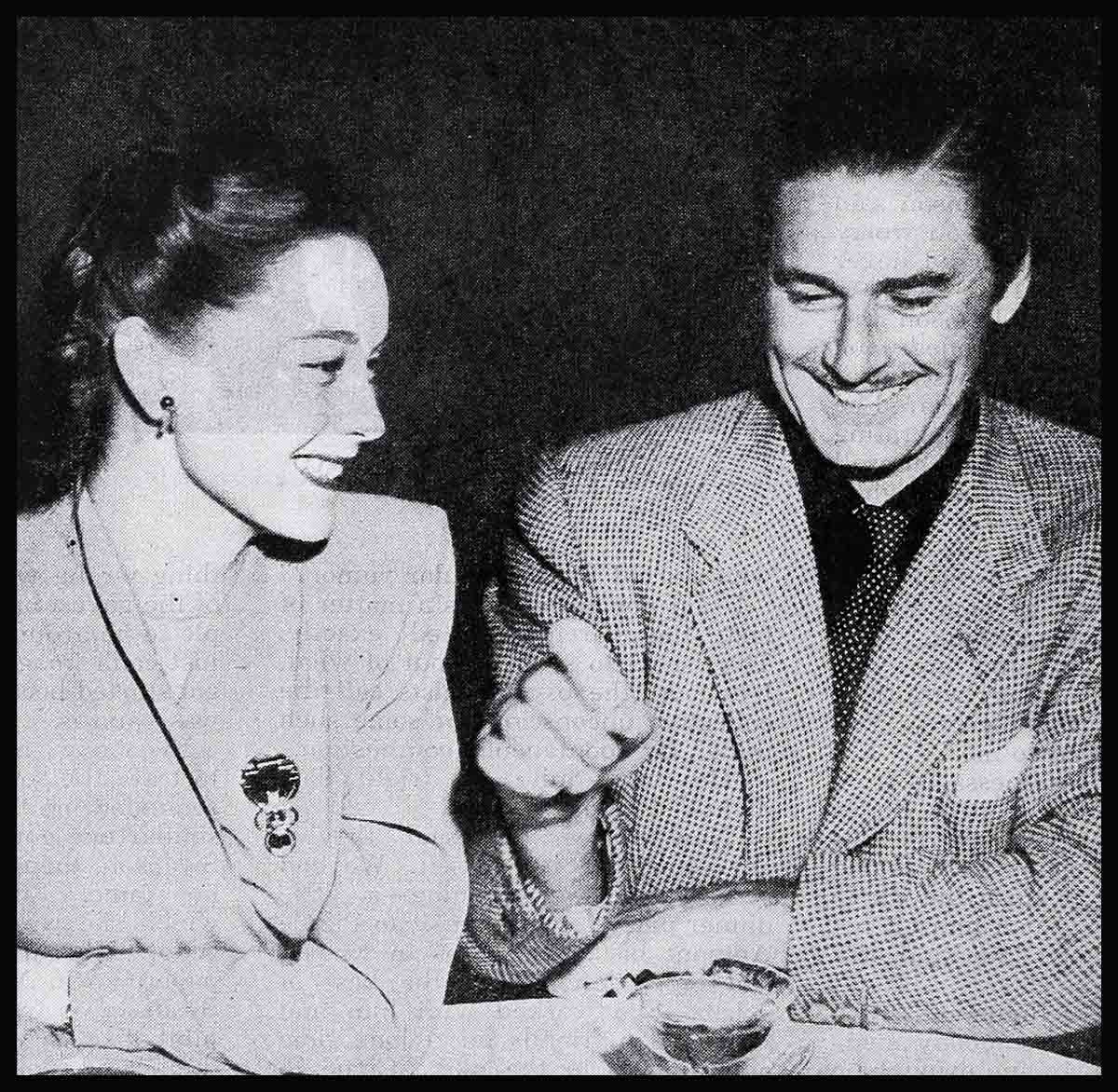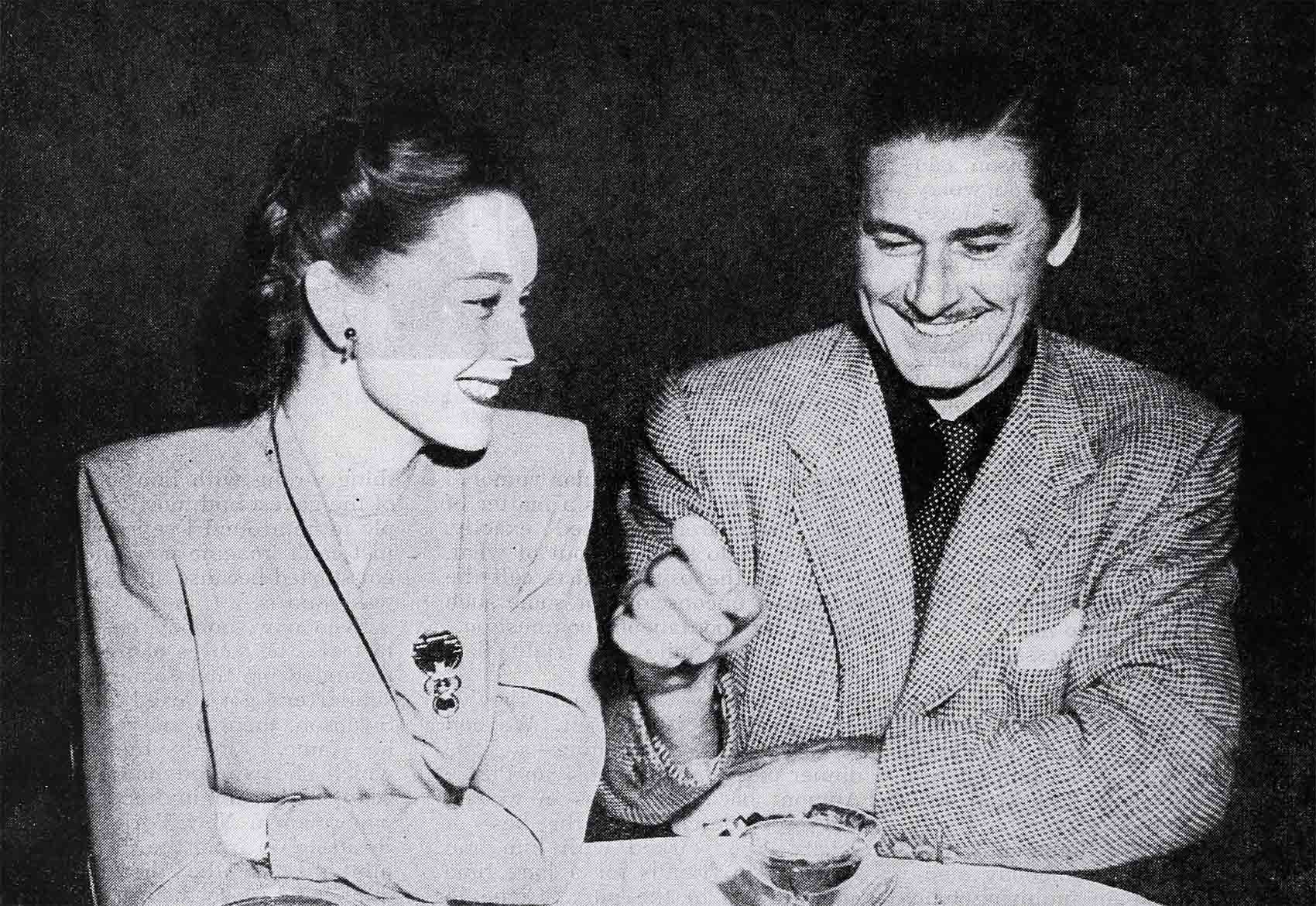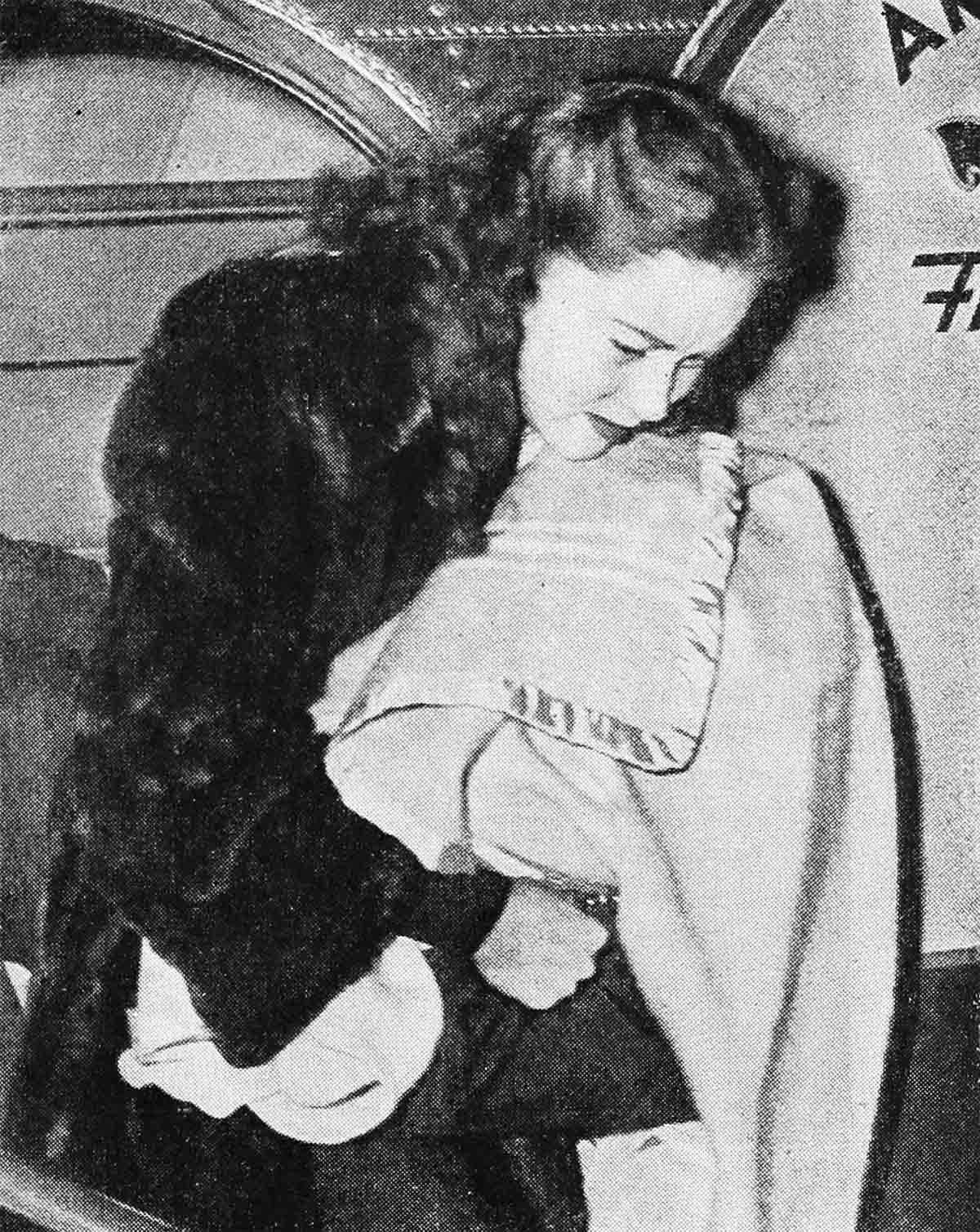
Nora Eddington Talks About Her Marriage
What would she be like—this girl who bore Errol Flynn a child in Mexico City and who, since then, has been a headline story?
When a mutual friend told me he was bringing Nora Eddington to my home a dozen questions leaped to mind. Would she be bitter? Disillusioned? Sorry for herself? Angry with the man she had loved so desperately? Or is she beaten and defeated at twenty-one—seeped in the philosophy of “I don’t care. What does anything matter now?”
Frankly, I was set for any mood I might find her in. I’ve usually been on “the woman’s side” ever since I started covering movie heartaches and heartbreaks over thirty years ago. I was prepared to weep with her, if need be—or to listen with indignation to her story of scorn and bitterness.
After two hours spent with Nora I knew that she was not shouting her anger at Errol to the high heavens because she told me, and I believed her, that there was no bitterness in her heart for the dashing Irishman she has loved so well.
She did feel hurt and humiliation at his silence about their marriage.
“I can take it for myself,” she told me. “But it is so humiliating for my father, my stepmother and for my precious baby. I can’t go around wearing my marriage license on my sleeve, or carry it in my handbag to flash on the skeptics who do not believe I am Mrs. Errol Flynn. My stepmother was crushed the other day when she went marketing and a strange woman came up to her and said, ‘How is that notorious Flynn baby?’ ”
Nora was sitting across the table from me in my garden and the late afternoon shadows were just beginning to fall. She’s such a pretty thing with her natural red hair and green eyes. With the exception of bright lipstick she wears no make-up—and her complexion is like peaches and cream. She makes no fluttery, nervous gestures. During most of our talk she sat with her hands folded upward in her lap like a well-behaved child.
Her manner is like a child’s, too—direct and simple. There was no beating around the bush. She knew why I had asked to see her and she spoke of Errol always with complete naturalness and sincerity. The first thing she said was, “I can never say a word to hurt him. I suppose he will always be in my heart.” Ah, that same old refrain of pain spoken by women who have loved greatly—and unhappily! I know all this publicity has hurt her beyond words—yet she has constantly made excuses for Flynn.
“He can’t help it,” she said. “He doesn’t want to be tied down. He loves excitement. And he just isn’t the type to settle down and be the conventional married man.
“I knew this from the beginning. I knew what I was getting into from the start—so I have only myself to blame. No woman alive can hold him. Why should I expect to be the one person who could arouse a constancy he has never felt before in his life?
“You know,” she went on, “I was on the verge of marrying another man when I met Errol. I had been going around with a Marine and I thought I was in love with him—and then I met Errol. I suppose I was swept off my feet by his attentions and his charm. Believe me,” she said with simple dignity, “he is the most charming man I have ever known or ever expect to know.”
I said, “You met Errol during his trial when you were working at the cigar stand in the City Hall, didn’t you?”
“That story is all wrong although it has been well circulated,” she said quickly. “I saw him during his trial, but we actually met for the first time at a party in April after the trial. The case had been tried in January, 1943, when I was filling in at the cigar stand for a girl friend who was ill. She didn’t want to lose her job so I took over for a week or ten days. It wasn’t my regular work. No, it didn’t make my heart go pit-a-pat when he passed the stand on his way in and out of the courthouse. But later, when I met him at the party—I knew I was in love. We started going around then—and I was the happiest girl in the world.”

Suddenly a little catch came into her voice, “I wouldn’t have minded his going out with other girls without me before and after we were married, because I’m not jealous. But what hurts is that people look at me as though I were just a cheap girl who passed in and out of his life. Just a few days age I overheard a group of girls saying, ‘That Nora Eddington! She thinks she married Errol Flynn!’
I said, “Nora, what will you do? You can’t continue to live by yourself, never see people and see Errol only when he wants to see you and not see you when he isn’t in the mood.”
“I’ve thought it all out,” she replied. “I plan to get a divorce and live quietly with my baby. I don’t want any money from him for myself. All I want is support for our daughter. I intend to get a job and support myself. I might go back to Mexico—at least long enough to get the divorce. My mother is a Mexican and I speak Spanish as fluently as I do English. I know the people down there. That is why I wanted my baby born there and why I may seek my divorce in Mexico.
“I hate the thought of a divorce because I was the child of a divided family. I spent half my time with my father and half with my mother and grandmother.” Nora is now living with her father and stepmother. She adores her stepmother who has been with her through all her trophies.
It is impossible to talk with this girl for any length of time and not like her and realize that she has character and a good background. I thought to myself, “She is a girl any man should be proud to call his wife.” It was with a feeling of real sympathy for her that I asked, “Do you think there is a chance of a reconciliation?”
She shook her head. “I don’t see how Errol can change—he wouldn’t be Errol if he did. I’m glad that when I think of him it is always about how tender and sweet and thoughtful he was when my baby was born.
“He has always been good to me. We have never had any quarrels—not serious ones, anyway—just a few words. I know that he loves the baby very much. She is so beautiful—and he is very proud of her.”
I could agree to that. Soon after Errol had come back from Mexico I met him at a party and while he refused to admit his marriage to Nora, he raved about the baby. “She’s the most beautiful little baby I ever saw,” he told me enthusiastically. “From the minute she was born she wasn’t all red and shriveled up. She is really a little beauty. And don’t think she can’t turn the charm on and off at will.”
“Just like her old man,” I laughed.

I repeated this to Nora and she smiled. “Yes, I read that in your column and I was glad that Errol told you about the baby. The only thing he has ever said that hurt me to the quick was when he was quoted saying, ‘If I were married as many times as the papers say I would win an Academy Award for bigamy.’ That really hurt although,” she added quickly, “he says he never made such a remark. And I believe him.”
I asked Nora if it had ever crossed her mind to become an actress. She is so very pretty and she has a beautifully modulated speaking voice.
“I don’t know just what I want to do,” she admitted. “I want to earn enough money to take good care of my baby. I am sure there is a job somewhere for me. But, first, I want peace of mind. I want to find a small house here and get settled with the baby for she is my first consideration. After that, I’ll start planning my future life.”
The Last thing that was in her mind was any chance of a legal fracas with Errol over financial settlement. “I’ll take whatever he gives me,” she said. “I know he will do the right thing about the baby. You see, I know Errol and in spite of his flirtatious ways—there is a fineness about him. Sometimes he seems to me like a lovable little boy. He makes me feel so mature in comparison, and so maternal, that I sometimes wonder if I am still madly, passionately in love with him. If I were I think I would go crazy with jealousy—but I am not that way.”
If I ever heard a girl whistling in the dark—that was it! When she spoke of wondering if she loved him passionately I knew she was trying hard to convince herself. She didn’t convince me. I know by everything she told me and by the standards of her upbringing that Nora had hoped for a happy, normal married life with the man she loves.
I said, “Nora, you are so young to be bolstering yourself with philosophy and makeshifts. Every woman has the right to a home and a husband and children.”
She answered quickly, “I can only repeat what I told you before. You mustn’t blame Errol. I knew his views when I married him. He can’t endure the feeling of being restrained. He must be free to come and go. A wife who demanded a conventional life would become like an iron chain to him. I couldn’t bear that.”
‘‘Then you must begin to believe that there is happiness and brightness ahead for you with someone else,” I told her. “You are so young. You will meet and marry another man after this hectic, publicized chapter in your life is past.”
She nodded her head. “I do believe that there is happiness for me somewhere. Of course, I cannot think now of any other man. I can’t believe I will love like this again. Only time can tell about that. But I have one wonderful thing—my little girl, Deirdre. When I take her in my arms everything seems all right. A woman doesn’t live until she has had a baby. Because of her—any unhappiness I may have had was worth it—and more.”
It was time for Nora to get home to her baby. As she left she said, “When you write a story—please, for my sake, don’t make Errol a heavy—or blame him. There aren’t any heavies in our story. It just happened—the way it happened. Someday I know in my heart that he will admit our marriage. He practically did,” she smiled, “according to his fashion, when he told a reporter: ‘Yes, we’re married. But it’s nobody’s business.’ ”
I thought about that—and about Nora—a long time after she had gone. Then just a week later an interesting thing happened.
Nora telephoned me to ask if Doctor Martin and I would come to Errol’s house the following Sunday for luncheon. We went. Errol was his most charming self, a delightful host. Nora was in seventh heaven as he introduced her to Hollywood as his wife. She showed me a gold bracelet he had just given her and she was radiant and so gracious as she received the Gary Coopers, the David Selznicks, Sir Charles Mendl, Ida Lupino and other guests who had been invited to meet her.
It was a warm enough day for summer clothes and the garden outside was filled with Errol’s friends. After luncheon the guests lingered on talking with the bride and groom.
As I left I said to Nora, “What about the divorce?”
“Today I feel that I never want a divorce,” she replied. “But I cannot say that I have definitely decided not to give Errol his freedom. I want to do what he wants and I think he is happier as a bachelor!”
Yet pride was in every look and gesture of Flynn’s as he stood with her, proudly presenting her to his friends. For Nora is no ordinary girl. She has a rare sweetness and character.
And this I know—she will do what seems best for “Flynn,” as she calls him.
THE END
BY LOUELLA O. PARSONS
It is a quote. PHOTOPLAY MAGAZINE JULY 1945




